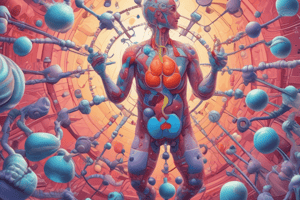Podcast
Questions and Answers
What is the definition of toxicology?
What is the definition of toxicology?
- The science that deals with the study of poisons, detections, their effects & methods of treatments for the condition procedure (correct)
- The science of preparing and dispensing drugs
- The study of drugs and their effects on the living system
- The study of the interactions between drugs and cellular constituents
Which source of drugs is an example of a mineral?
Which source of drugs is an example of a mineral?
- MgSo4 (correct)
- Digoxin
- Insulin
- Antibiotics
What is the purpose of receptors in pharmacology?
What is the purpose of receptors in pharmacology?
- To detect poisons in the body
- To produce drugs from natural sources
- To prepare and dispense drugs
- To create a response in the living system (correct)
Where are Type 1 receptors located?
Where are Type 1 receptors located?
Which of the following is an example of a semi-synthetic drug?
Which of the following is an example of a semi-synthetic drug?
What is the main focus of pharmacy as a science?
What is the main focus of pharmacy as a science?
What is the definition of pharmacology?
What is the definition of pharmacology?
Which of the following is an example of action on specific receptors according to the text?
Which of the following is an example of action on specific receptors according to the text?
What does pharmacokinetics deal with?
What does pharmacokinetics deal with?
Which drug is mentioned as partially metabolized in the liver according to the text?
Which drug is mentioned as partially metabolized in the liver according to the text?
What does pharmacodynamics deal with according to the text?
What does pharmacodynamics deal with according to the text?
What is the main focus of pharmacodynamics as per the text?
What is the main focus of pharmacodynamics as per the text?
What is the main focus of toxicology?
What is the main focus of toxicology?
Which of the following is an example of a plant source of drugs?
Which of the following is an example of a plant source of drugs?
What is the definition of receptors in pharmacology?
What is the definition of receptors in pharmacology?
Where are Type 2 receptors located?
Where are Type 2 receptors located?
What is the main focus of pharmacy as a science?
What is the main focus of pharmacy as a science?
Which aspect of pharmacology deals with the effects of drugs on the body, including the mechanism of action and physiological effects?
Which aspect of pharmacology deals with the effects of drugs on the body, including the mechanism of action and physiological effects?
In pharmacokinetics, what does 'absorption' refer to in relation to drugs?
In pharmacokinetics, what does 'absorption' refer to in relation to drugs?
Which drug action mechanism involves changing metabolic processes, such as inhibiting cell wall synthesis in bacteria?
Which drug action mechanism involves changing metabolic processes, such as inhibiting cell wall synthesis in bacteria?
What type of drugs act through interference with a selective passage of ions across the cell membrane?
What type of drugs act through interference with a selective passage of ions across the cell membrane?
What does pharmacology primarily deal with?
What does pharmacology primarily deal with?
Study Notes
Definition of Terms
- Toxicology is the study of the adverse effects of chemicals on living organisms.
- Pharmacology is the study of the effects of drugs on the body, including the mechanism of action and physiological effects.
- Pharmacy as a science focuses on the discovery, development, and use of drugs for the prevention and treatment of diseases.
- Receptors in pharmacology are molecules that bind to specific drugs, allowing them to exert their effects on the body.
Sources of Drugs
- Minerals are a source of drugs, such as lithium used to treat bipolar disorder.
- Plants are a source of drugs, such as morphine derived from the opium poppy.
Receptors
- Type 1 receptors are located on the surface of cells and are responsible for quick responses to drugs.
- Type 2 receptors are located inside cells and are responsible for slower responses to drugs.
Pharmacokinetics
- Pharmacokinetics deals with the absorption, distribution, metabolism, and excretion of drugs in the body.
- Absorption refers to the process of a drug entering the bloodstream after administration.
Pharmacodynamics
- Pharmacodynamics deals with the effects of drugs on the body, including the mechanism of action and physiological effects.
- The main focus of pharmacodynamics is the study of the response of the body to drugs.
- Semi-synthetic drugs, such as oxycodone, are an example of drugs that act on specific receptors.
Drug Action Mechanisms
- Inhibiting cell wall synthesis in bacteria is an example of a drug action mechanism that involves changing metabolic processes.
- Ion channel blockers are a type of drug that acts through interference with the selective passage of ions across the cell membrane.
Studying That Suits You
Use AI to generate personalized quizzes and flashcards to suit your learning preferences.
Description
Test your knowledge of pharmacology with this quiz on the effects of drugs on living systems, their preparation, uses, mechanisms of action, and side effects. Explore concepts such as pharmacodynamics and the physiological effects of drugs on the body.




